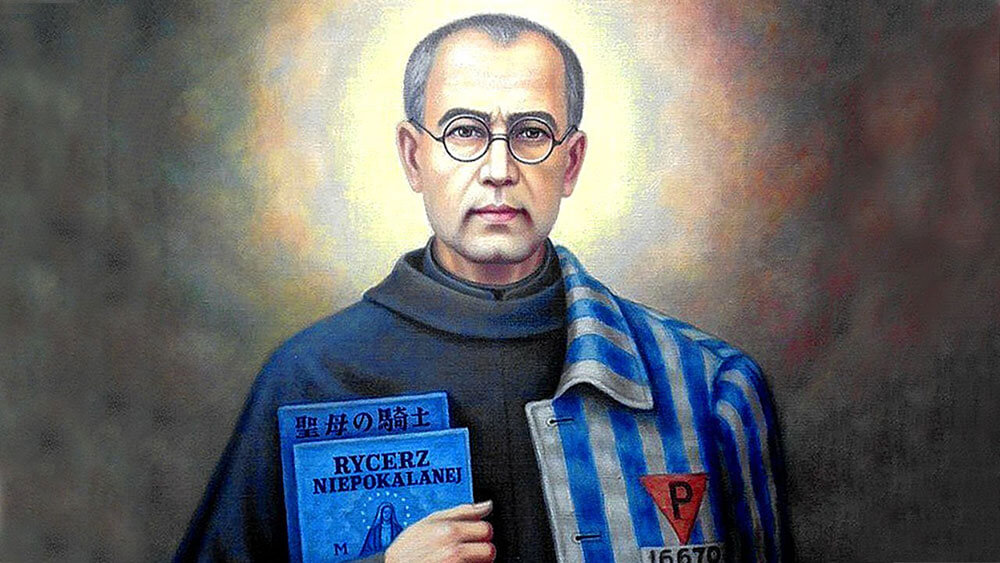Today the Church celebrates the feast of St. Maximilian Kolbe, a Franciscan friar who died in the Auschwitz concentration camp during World War II. Maximilian Kolbe volunteered to take the place of another prisoner chosen for execution, becoming a model of Jesus’ words, “Greater love has no man than this, to lay down his life for his friends.”
While many people know about the death of Maximilian Kolbe, not as many know of the inspiring life he lived before his act of sacrificial love. Fr. David Jenuwine, parochial vicar of St. Vincent de Paul parish in Petaluma, CA, stopped by Morning Air® this week to discuss the life of St. Maximilian Kolbe and how we can use his example to grow in holiness.
As a Franciscan friar, Maximilian Kolbe was devoted to sharing the Gospel, and took advantage of every means possible to do so. Fr. Jenuwine explained that “He founded what’s called The Militia Immaculata. He wanted to create an army of people praying to Our Lady. … St. Maximilian Kolbe took advantage of media to spread devotion, to continue to admonish people, and to encourage people to persevere in prayer, to turn to Our Lady, and to learn their faith.”
Just as Maximilian Kolbe used the media to share the Gospel and encourage people in prayer, Fr. Jenuwine pointed out that today we can follow his example by using the gifts of modern-day technology.
“Back in his day, technology meant printing presses and amateur radio stations. … But all of us today have an evangelization tool in our pockets. It’s a smartphone, and we really can use it to share the good, the true, and the beautiful. We don’t have to jump on the latest snarky thing on social media. We can change the conversation. That’s the power that we have, and the gift that God has given us.”
During Maximilian Kolbe’s life there were many dangerous forces and ideologies that spread evil and harm. But rather than hiding during these dangerous times, Maximilian Kolbe chose to fight evil with good. This is a lesson we can apply to our own lives, especially when it comes to how we interact online.
“We don’t hide our light under a bushel basket,” Fr. Jenuwine said. “We have the media of the day, and it’s not amateur radio or a printing press, it’s the internet. And we have at our disposal every moment of every day, the opportunity to choose to edify or choose to tear down. And it’s up to us how we use that.”
Another inspiring aspect of Maximilian Kolbe’s life was his time in the starvation bunker in Auschwitz. Fr. Jenuwine said, “They put him into a starvation cell and he continued to pray. He continued to encourage. He sang hymns, he recited Scripture, he just continued to be a priest, to the frustration of his captors. Because eventually the others died of starvation and dehydration, and Kolbe, despite the physical effects of starvation and dehydration, continued to be alert. He continued to pray out loud, continued to sing hymns to Our Lady and church songs until they had to give him a lethal injection.”
“That was an encouragement to those other captives in Auschwitz. They were hearing hymns, prayers, and praises of God coming out of this cell where prior they had heard despair. And that became a sign of hope for the others who were held captive.”
While this is an example of truly heroic virtue, it is something we can practice in both big and small ways in our own lives. How often do we let small inconveniences ruin our mood? How often do we give in to despair and desolation? Maximilian Kolbe shows us that, no matter our circumstances, we can turn our worries over to the Lord and give hope to others.
“It’s just amazing that we tend to focus on ourselves, and here even in his extreme circumstances Maximilian Kolbe turned out and focused on God,” said Fr. Jenuwine. “I think that’s a lesson for all of us. Even if it’s the most minor ache or pain we can continue to turn to God, continue to pray, and continue to praise Him and thank Him. And that’s something that we don’t tend to focus on.”
“In our day and age we tend to internalize everything and kind of self-pity. We focus on the pain, on the disease, on the crisis instead of recognizing that in the midst of whatever it may be, that there is a God who loves us, a God who desires to spend eternity with us, and a God who is calling us every moment of every day, to draw closer to Him in prayer, in praise, and thanksgiving.”
Hear more lessons on the life of St. Maximilian Kolbe by listening to the full conversation below:
Morning Air can be heard weekdays from 6:00 – 9:00 a.m. Eastern/3:00 – 6:00 a.m. Pacific on Relevant Radio and the Relevant Radio App.


